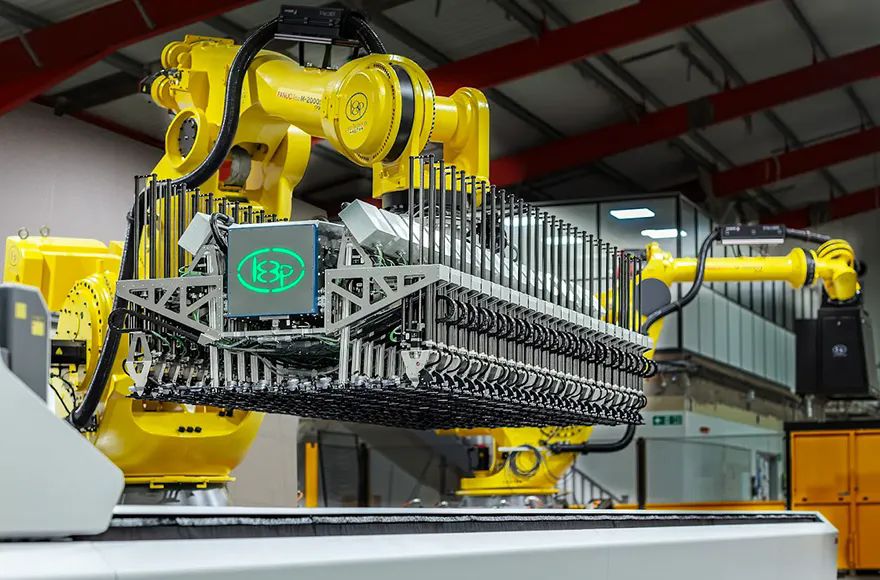 Three Fanuc M-2000iA/1700L six-axis industrial robots are being employed as part of Project Compass
Three Fanuc M-2000iA/1700L six-axis industrial robots are being employed as part of Project CompassAgainst a backdrop of geopolitical uncertainty, global military expenditure has surged, in fact rising by almost 10% in a single year to reach $2,718 billion in 2024. The USA, China and Russia remain the largest spenders, but defence stocks across Europe hit record levels in 2025. The UK is no exception. According to the
Institute for Fiscal Studies (IFS), Britain spent £66 billion on defence in 2024–25, equivalent to 2.3% of national income, and has committed under NATO agreements to increase this to 3.5% of GDP by 2035.

Oliver Selby, head of sales at Fanuc UK (pictured right), said: “The race to strengthen sovereign defence capabilities is well underway. Yet with multiple nations competing for the same resources, procurement costs are likely to rise if production capacity cannot keep pace with demand. The question for the UK is how to avoid being left behind.
“One answer lies in automation. In manufacturing, automation remains the fastest and most efficient way to boost production capacity. However, the UK currently lacks sovereign robotic OEMs or large-scale solution providers — a gap that raises concerns over security and intellectual property control. For a country that hosts leading defence and aerospace firms such as BAE Systems, Airbus and Rolls-Royce, reliance on foreign automation technology introduces strategic vulnerabilities.”
As one of the world’s leading robot manufacturers with a long-standing British presence, Coventry-based
Fanuc UK Ltd believes it is well placed to provide domestic automation support. We understand that the European — and indeed global — defence spending landscape is changing rapidly. By supporting not only prime and tier defence companies, but also increasing automation capacity within wider manufacturing facilities, we can strengthen the UK’s sovereign supply chain.
Feather in Fanuc‘s capFanuc UK’s base in Coventry is spearheading this effort, though the company acknowledges its Japanese ownership. However, this is mitigated by ongoing defence collaborations between the British and Japanese governments, such as the Global Combat Air Programme (GCAP) — a multi-national initiative led by the UK, Japan and Italy to develop a sixth-generation stealth fighter. Fanuc also holds around a 50% global market share for CNC delivery to machine tool manufacturers, many of whom are heavily used in aerospace production. Knowing that these machines operate on a common control platform, developed and managed by a trusted source, is another feather in Fanuc’s cap.
Cybersecurity is another critical consideration. The European Union‘s new Cyber Resilience Act (CRA) comes into force in September 2026, with full enforcement by December 2027. It mandates that hardware and software products with digital elements must be secure by design, provide security updates, and report vulnerabilities throughout their lifecycle. The new Fanuc R50iA controller — based on the latest CNC hardware, FS500 — is already fully CRA compliant. Over the next two years, all of its robots will feature this controller as standard, while older models will undergo validation to meet the new requirements well ahead of time.
Mr Selby continued: ‘Reliability and longevity are equally vital. Defence and aerospace projects often span decades and involve complex engineering and compliance layers. Fanuc’s reputation for robust, future-proofed equipment is a key advantage. We provide lifetime support on our products, assuring spare parts availability and local service worldwide. We are still servicing robots purchased more than 20 years ago that remain in perfect working order.
“Innovation is also central to Fanuc’s strategy. The company works closely with manufacturers, universities, R&D institutes and High Value Manufacturing Catapults (HVMCs) to deliver solutions that meet evolving market needs. A prime example is Project Compass — an £80 million aerospace manufacturing R&D initiative involving Loop Technology, Boeing, Spirit AeroSystems and the Advanced Manufacturing Research Centre (AMRC). Fanuc robots, including three Fanuc M-2000iA/1700L six-axis models, are playing a pivotal role. Fanuc also collaborated with Airbus to develop an industrial drilling robot — the M-800iA/60 — tailored to the company’s requirements.”
He concluded: “Engaging regularly with prime manufacturers and Tier One suppliers is crucial to reducing financial, technical and security risks, while accelerating project delivery. Fanuc remains committed to supporting partners across the defence and aerospace sectors with automation solutions that enhance security and resilience. We look forward to seeing the results of our increased focus on bolstering the UK’s defence capabilities with domestic automation solutions. The security benefits this can deliver are significant for all.”